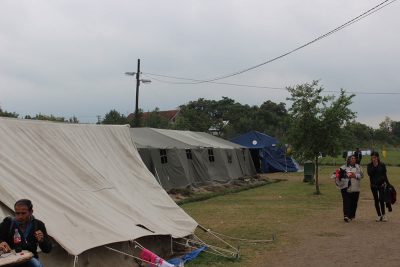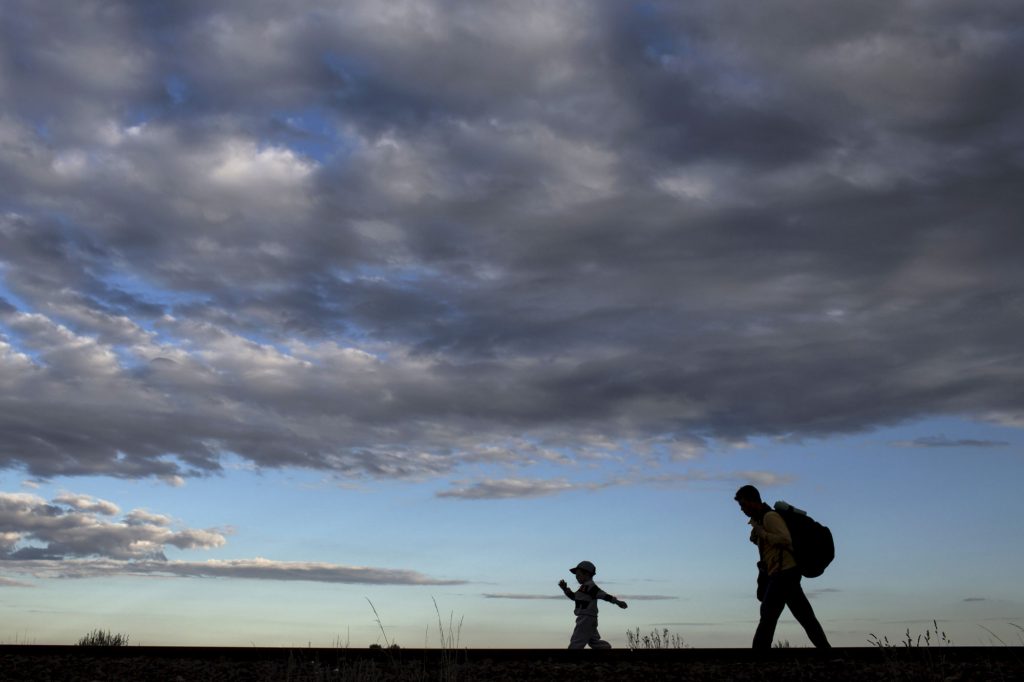Abdullah’s journey began when his home was destroyed in his hometown of Derezor, one of the many front lines in the Syrian civil war. The bombardment began with planes but soon tanks were rolling down his street. Three quarters of the people of his city left for the safety of Turkey.
“Only the soldiers and dead people stayed behind.” Abdullah says with great sadness.
Today, he and his wife and three children, along with the four other families he is travelling with are resting at an assistance point set up by the Serbian government close to the border with Hungary. After weeks of travelling, with only the possessions they could carry Abdullah and his family are just 18 kilometres from the European Union.
This site, with its three rows of tents, a single water point and just a few latrines, provide some of the best conditions they have seen since their journey began.
“We will rest here for a few days. We have a tent for us, even though 19 people in here is very tight, it is better than the camping tents we have used along the roads so far.”
When his home was destroyed, Abdullah decided he must get his family to safety, but the border was controlled by ISIS and he knew they would never let him through. So they used whatever savings they had to people smugglers who could get them out of Syria into Turkey.
“These smugglers are trading in people’s souls. They are not human.”
They remained there, in a camp for refugees, for almost 2 years, but throughout this time, Abdullah could not work and his children could not go to school. Finally, when his wife gave birth to their third child, a daughter, he decided that the family could not live like this in limbo any longer. With 4 of his neighbors and all of their children, they set off on the long road to the safety of Europe.
“We were most scared when we set off in the small plastic boat to cross from Turkey to Greece. People had been calling them ‘Death Boats’ so we were all afraid. The first time it broke down a few metres from the Turkish beach and we had to be rescued. We were lucky it didn’t happen further out to sea. The second boat was very crowded, 50 people in a plastic boat, but we made it safely across.”
Abdullah immediately went to the authorities in Greece and registered his family. Yet there were no camps or proper facilities.
“We slept in the park. I had to put my 10-month-old baby to sleep on a pizza box, it was very hard.”
Since then they have crossed several borders, from Greece into Macedonia, now Serbia where they have reached the very edge of the European Union.
“Once we have all recovered our strength we will try to enter Hungary with our papers. We cannot risk entering illegally with our children, and we will never use people smugglers again.
We want to thank all of the European countries and people who have helped us along the way. Syria is our country and we always want to return but for my children we have to take this chance for a better future.”
Dave Eastman, leader of the International Medical Corps assessment team in Hungary and Serbia, observes, “Our major worry at this point is that winter is fast approaching and the risks to the health of families passing through here is only going to increase. The local teams working with these families on the Serbian border are already at full capacity, so if the borders with Hungary become impossible to cross the basic services here will quickly be overwhelmed.”

